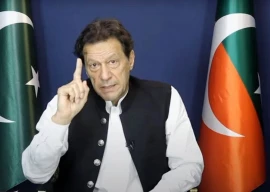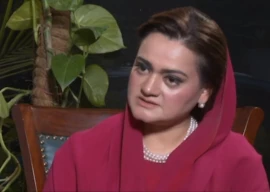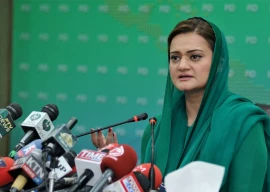
Lisa Curtis, an American policy expert and former government official, shed light on the political instability in Pakistan, raising concerns over its potential ramifications in the aftermath of former prime minister Imran Khan’s arrest.
Curtis highlighted the country's economic difficulties, ongoing negotiations with the International Monetary Fund (IMF) for a bailout plan, and recent terrorist attacks by the Tehreek-e-Taliban Pakistan (TTP) during an interview with VOA Deewa Radio.
Curtis served in the White House National Security Council under President Trump as the senior director for South and Central Asia from 2017 to 2021. Prior to that, she worked at The Heritage Foundation, a conservative think tank, where she focused on America's foreign policy in Asia.
Her area of expertise includes US national security policy, counterterrorism strategies, and the political and security issues in South Asia. She has worked in various roles in the US government, including as a staffer for the Senate Foreign Relations Committee, a senior advisor at the State Department, and a CIA analyst.
Speaking about the delicate situation, Curtis underlined the significance of Pakistan as a nuclear-armed nation sandwiched between India and Afghanistan. The combination of political instability, economic woes, and security threats poses a considerable challenge for Pakistan. Curtis noted that while political instability is not new to the country, the current situation differs due to tensions between former prime minister Imran Khan and the army.
Also read: US, UK back ‘rule of law’ after Imran’s arrest
Curtis emphasised that the arrest of Khan following his accusations against a senior military official had further strained the relationship between the government and the military. The arrest fueled public anger, which, instead of being directed solely at the Pakistan Tehreek-e-Insaf (PTI) chief, became directed at the army itself—a development that the military leadership would undoubtedly seek to address due to its reputation's importance among the Pakistani people.
Addressing concerns from a US perspective, Curtis outlined that while the United States aims to remain cautious about getting involved in Pakistan's internal politics, certain issues need attention. The United States would seek assurances regarding the safety and control of Pakistan's nuclear weapons. Additionally, it would be wary of any potential diversionary tactics or conflicts with India that could distract attention from internal instability.
Reflecting on the multi-ethnic nature of Pakistan, Curtis acknowledged that the military traditionally relied on patriotism, Islamic identity, and youth support. However, she highlighted the unprecedented situation where public anger was directed at the military due to heavy-handed tactics employed during Imran Khan's arrest. Curtis emphasized the delicate balance the military must strike between negotiating with the popular politician and maintaining stability, public trust, and the functioning of the democratic process.
Regarding the US-Pakistan relationship, Curtis acknowledged the diminished interaction at the diplomatic level since the Taliban takeover in Afghanistan. She highlighted the divergence of views on the Taliban, with the United States condemning their actions and Pakistan's differing stance.
Also read: How international media covered Imran Khan’s arrest
Curtis pointed out that the Taliban's continued links to terrorism, including al-Qaeda, make finding common ground challenging.
Curtis also discussed the growing influence of China in Pakistan, particularly in economic and political realms. While the United States desires a positive relationship with Pakistan, Curtis raised concerns about the lack of transparency and the potential long-term implications of Chinese investments under the Belt and Road Initiative.
She urged Pakistan to consider the experiences of countries like Sri Lanka, cautioning against over-indebtedness and the loss of sovereignty.
As Pakistan grapples with political instability, economic challenges, and regional complexities, the situation remains fluid. The United States continues to monitor developments, mindful of its own interests and the need to balance engagement with non-interference in Pakistan's internal affairs.
1730806656-0/BeFunky-collage-(23)1730806656-0-405x300.webp)





1730806490-0/New-Project-(2)1730806490-0-270x192.webp)
1730802981-0/Untitled-design-(53)1730802981-0-270x192.webp)

1730799445-0/Untitled-design-(52)1730799445-0-270x192.webp)
1730800230-0/Copy-of-Untitled-(5)1730800230-0-270x192.webp)








1730706072-0/Copy-of-Untitled-(2)1730706072-0-270x192.webp)
COMMENTS (1)
Comments are moderated and generally will be posted if they are on-topic and not abusive.
For more information, please see our Comments FAQ